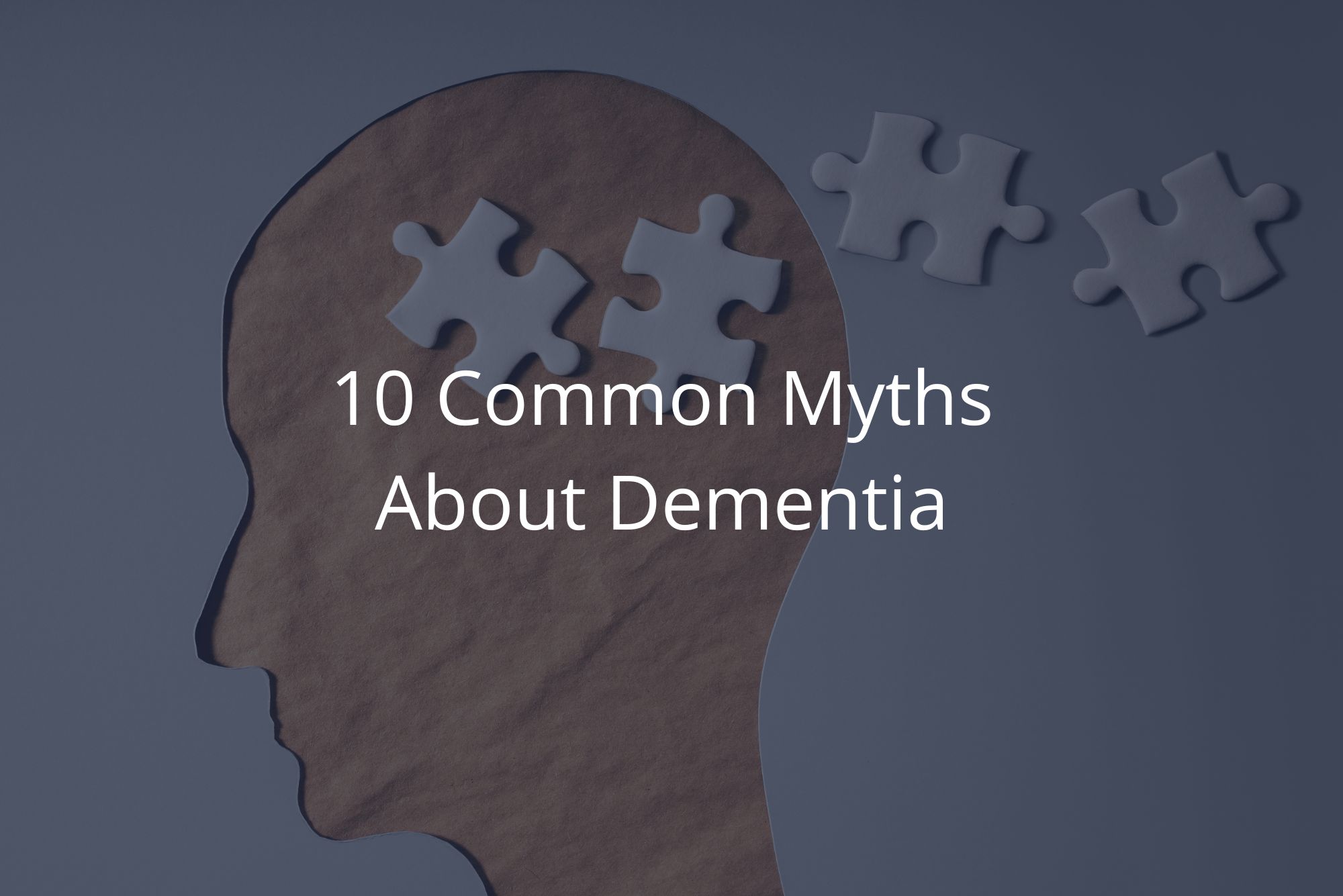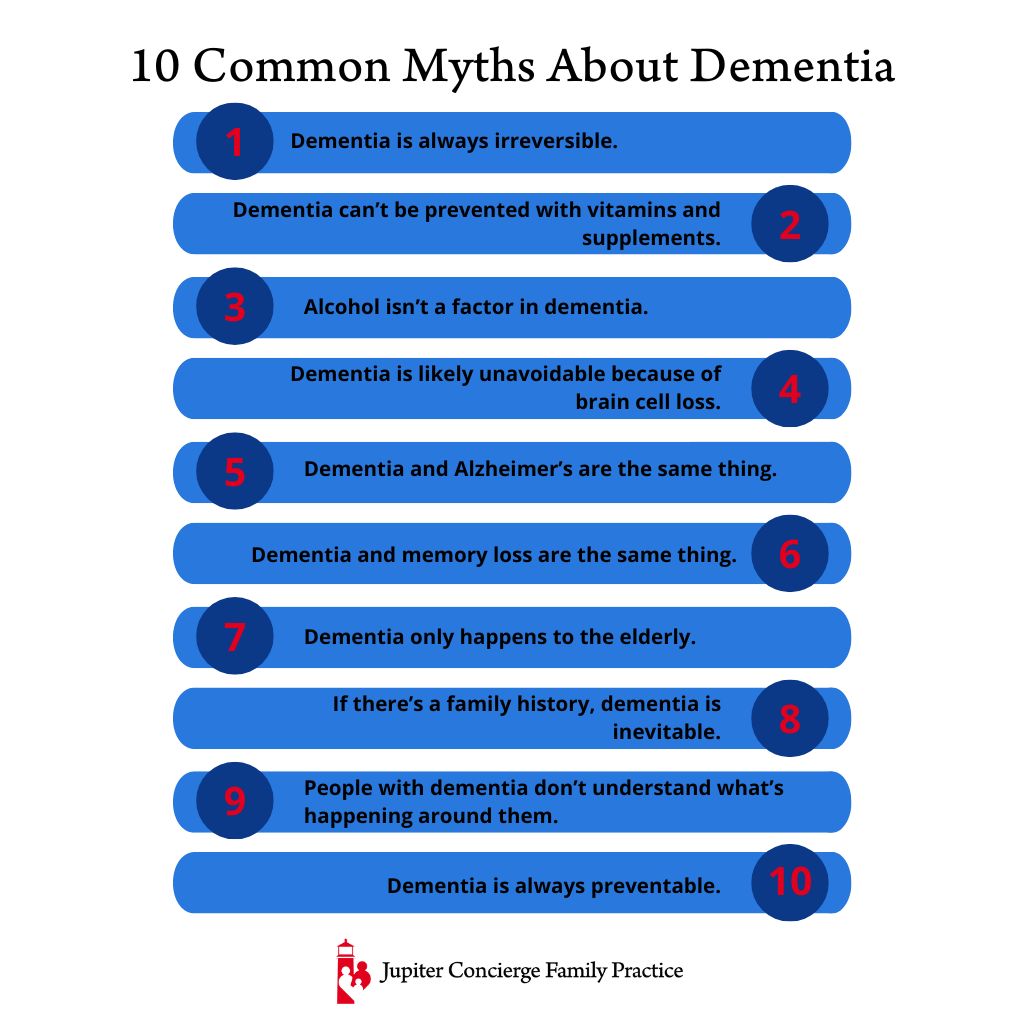
More than six million people in the United States are living with Alzheimer’s disease and related dementias. Dementia, while not a normal part of aging, is a very common disease process that occurs in the latter parts of life. Yet some people live into their 90s without ever developing a single sign of dementia.
What is dementia, and how — if at all — can we avoid it? In this post, we’ll debunk 10 common myths about dementia.
Myth #1: Dementia is always irreversible.
This is one of the trickiest myths, so let’s tackle it first. There are many nuances at play here. In simple terms, dementia can be reversed if it’s detected early enough.
Assuming the dementia isn’t due to an irreversible cause, like a stroke that leads to loss of brain function, we have more treatment options. For example, if the culprit is problematic neurotransmitters, we can treat that through lifestyle changes and supplementation.
In such cases, when it comes to reversing early signs of dementia, sustained, consistent lifestyle changes across the board are required. These lifestyle changes vary depending upon each case, but the more of them you can make, the better. One lifestyle change isn’t going to be nearly as effective as 10 or 20 changes.
Another aspect is nutrient management. Treatments with pharmacologic doses of specific vital nutrients, generally through supplementation, can help to reverse the process.
The later dementia is diagnosed, the harder it is to treat. Many people go to the doctor much too late. Throughout the first 10 years of their memory issues, they only notice symptoms themselves; the next 10 years, other people start to notice. The last three years — when the symptoms have really worsened — they finally consult their doctor. By then, it’s usually too late.
Myth #2: Dementia can’t be prevented with vitamins and supplements.
It’s true that there’s no magic pill or single vitamin that can prevent dementia. However, according to some trusted sources, the combined and sustained intake of multiple nutrients can, in some cases, prevent and treat dementia.
Myth #3: Alcohol isn’t a factor in dementia.
No matter how much you drink, alcohol destroys brain cells, period. Simply reducing your alcohol intake is not as effective as eliminating alcohol altogether.
Myth #4: Dementia is likely unavoidable because of brain cell loss.
That being said, even if you never have a drop of alcohol in your life, your brain cells will begin dying gradually after ages 18–25. Fortunately, while the number of brain cells is important, so are the flexibility and communicativeness of those brain cells. This is something called plasticity.
Neuroplasticity is the term we use to describe how our brains’ circuitry works and connects. It allows us to reason and understand, and form new connections between existing brain cells when others die off. This keeps us functioning longer in spite of age-related brain cell death.
Myth #5: Dementia and Alzheimer’s are the same thing.
Alzheimer’s disease is a specific type of dementia. Dementia can come from a stroke, a vascular problem, toxins, or head trauma, to name a few. But Alzheimer’s is a specific kind of brain disease in which dementia is caused by a buildup of plaques that impact brain cell functioning. While a large percentage of dementia is related to Alzheimer’s, it’s not the same thing.
Myth #6: Dementia and memory loss are the same thing.
As brain cells die due to aging, a certain amount of memory loss is normal. This presents as general forgetfulness or short-term memory loss. Dementia, on the other hand, is a disease process that is not associated with normal aging. This article from the NIH delineates the differences between dementia and memory loss.
Myth #7: Dementia only happens to the elderly.
Dementia has many causes, and not all of them are age-dependent. People can experience head trauma at any age. They can experience toxin buildup at any age. The dementia associated with aging is usually vascular related, which means decreased blood flow to the brain over time due to plaque, or to cholesterol buildup in the arteries.
More often, younger dementia patients have chemically induced dementia. This could be due to congenital nutritional deficiency, or to toxins — either toxins from drugs they’re taking illicitly, or toxins they’re exposed to in their environment.
Myth #8: If there’s a family history, dementia is inevitable.
Many people with a family history of dementia can feel hopeless about their chance of developing the disease — “My father had dementia, so I’ll have dementia as well, no matter what I do.” But, assuming there is a genetic component, it still needs a trigger to activate into dementia. Someone’s lifestyle choices impact whether that trigger is released. Paying careful attention to the 4 Pillars of Health — exercise, diet, nutrition, and stress avoidance — can help.
Myth #9: People with dementia don’t understand what’s happening around them.
Dementia is a thought process dysfunction that’s associated with memory and logic. In mild cases, people are still aware of what’s going on around them. Their quality of life is still intact. For example, they may still enjoy reading a book, but after they put the book down, they may not remember what they read, or that they read it in the first place.
It’s the complex thought processes that are hindered first. Only in very severe cases do people become deeply unaware of their surroundings. Most cases remain in the mild camp.
Myth #10: Dementia is always preventable.
While some types of dementia are preventable, Alzheimer’s dementia may be inevitable for people who are predisposed to it. The goal, then, is to delay the onset as long as possible.
 Final Thoughts
Final Thoughts
Many people fear dementia, especially when Alzheimer’s disease is in their family history. That makes sense, as no one wants to lose their mental functioning.
As with most things, though, the myths surrounding dementia amplify the fear factor. It is possible to claim quality of life in your elder years, whether or not dementia touches you.

Dr. David Rosenberg
Dr. Rosenberg is a board-certified Family Physician. He received his medical degree from the University of Miami in 1988 and completed his residency in Family Medicine at The Washington Hospital in Washington, Pennsylvania in 1991. After practicing Emergency Medicine at Palm Beach Gardens Medical Center for two years, he started private practice in Jupiter, in 1993. He is an avid baseball fan and Beatles fanatic, since he was 8 years old. He has been married to his wife, Mary, since 1985 and has three grown children.
David completed additional studies at Mercer University, Macon, Georgia and obtained a BS in Chemistry in 1983.
“My interests include tennis, snow skiing, Pilates and self-development.”
